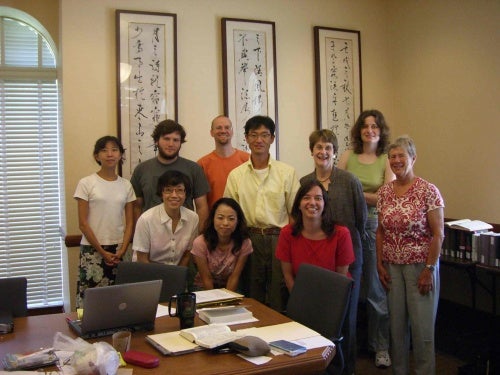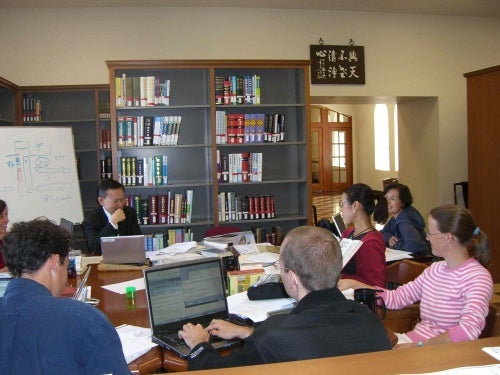
Participants gather for a photo at the 2008 Kambun Workshop.

Discussion from the 2007 Kambun workshop
At the workshop, 13 scholars--professors from UBC, Pittsburgh, Yale, Michigan, UCLA, and the University of Tokyo; as well as graduate students from USC, Princeton, and Japan's Ochanomizu University--will discuss the Chûyûki, an important diary of a Heian-period courtier.
In collaboration with USC's East Asian Library, Professor Joan Piggott of the History Department at USC College has organized the Kambun Workshop each summer since 2003. Participants have included scholars in all fields of premodern Japan studies--such as religion, history, art, linguistics, and literature--who come from around the world to learn more about reading primary sources written in Sino-Japanese (kambun), which is essential for studying the pre-1600 history of Japan.
Funding to support the workshop comes from the Association of Asian Studies North East Asia Council, USC College, and the Project for Premodern Japan Studies. Piggott also credits the libraries' rapidly growing Japanese studies collection for helping to establish the Kambun Workshop at USC.
Professor Piggott describes this year's workshop as follows:
Chûyûki Kambun Workshop, Summer 2009
The Project for Premodern Japan Studies at the University of Southern California is hosting a reading and translation workshop focused on a key Heian-period courtier diary, the Chûyûki. The annotated translation that results from this summer's workshop made up of professors and graduate students will be made available on the Kambun Workshop's Web site in 2010. It will then be prepared for publication in monographic form, just as another product of earlier Kambun Workshops, our annotated translation of the Teishinkôki: The Year 939 in the Journal of the Regent Fujiwara no Tadahira, has recently been published in the Cornell East Asia Series.
This workshop will begin on July 20. It will be led by two faculty veterans of the Kambun Workshops at USC and Cornell University, Professor Joan Piggott of the USC History Department and Professor Sanae Yoshida of the University of Tokyo’s Historiographical Institute. Participants will read, translate, and annotate sections of the Chûyûki journal kept by the leading court minister, Fujiwara no Munetada (1062-1141). Entries in the Chûyûki journal span the years between 1087 and 1138. We are eager to translate selections from this important journal into English because Munetada’s record is one of the most informative of the journals kept by a Heian-era elite.
A group of researchers began reading and translating sections of the Chûyûki during the summer of 2000 at Cornell University. And subsequently another section of the journal was translated and annotated by members of the Chûyûki Reading Group at USC between 2006 and 2008. Those draft translations will be the starting point this summer--we want to reread and check the earlier translations during the first days of the workshop. Then we will move on to read, translate, and annotate additional sections, focusing on the birth of the monarch Toba Tenno, in 1103. Therein readers learn of the rites that accompanied a royal birth, including banquets and gift-giving. We will follow the pattern set during recent Kambun Workshops: first we read the original Sino-Japanese (kambun) text. Then we transcribe it into modern Japanese. Then we translate and annotate the text in English. All three stages are important for the final product, which can be profitably studied by those interested in various facets of Heian Japan's history and culture. Unlike our Teishinkôki project which translated a full year of entries, our Chûyûki translation will contain selections chosen for thematic interest by Professor Yoshida, editor of the authoritative Dai Nihon Kokiroku volumes of the Chûyûki for the Historiographical Institute of the University of Tokyo.